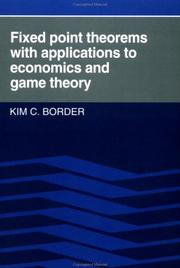| Listing 1 - 1 of 1 |
Sort by
|

ISBN: 0521388082 0521265649 0511625758 051186941X 9780521265645 9780521388085 9780511625756 Year: 1986 Publisher: Cambridge Cambridge University Press
Abstract | Keywords | Export | Availability | Bookmark
 Loading...
Loading...Choose an application
- Reference Manager
- EndNote
- RefWorks (Direct export to RefWorks)
One of the problems in economics that economists have devoted a considerable amount of attention in prevalent years has been to ensure consistency in the models they employ. Assuming markets to be generally in some state of equilibrium, it is asked under what circumstances such equilibrium is possible. The fundamental mathematical tools used to address this concern are fixed point theorems: the conditions under which sets of assumptions have a solution. This book gives the reader access to the mathematical techniques involved and goes on to apply fixed point theorems to proving the existence of equilibria for economics and for co-operative and noncooperative games. Special emphasis is given to economics and games in cases where the preferences of agents may not be transitive. The author presents topical proofs of old results in order to further clarify the results. He also proposes fresh results, notably in the last chapter, that refer to the core of a game without transitivity. This book will be useful as a text or reference work for mathematical economists and graduate and advanced undergraduate students.
517 --- 330.105 --- 519.83 --- 519.83 Theory of games --- Theory of games --- 330.105 Wiskundige economie. Wiskundige methoden in de economie --- Wiskundige economie. Wiskundige methoden in de economie --- 517 Analysis --- Analysis --- Economics, Mathematical --- Fixed point theory --- Game theory --- Games, Theory of --- Mathematical models --- Mathematics --- Fixed point theorems (Topology) --- Nonlinear operators --- Coincidence theory (Mathematics) --- Economics --- Mathematical economics --- Econometrics --- Methodology --- Quantitative methods (economics) --- Economics, Mathematical. --- Fixed point theory. --- Game theory. --- Game Theory. --- Business, Economy and Management --- Game Theory
| Listing 1 - 1 of 1 |
Sort by
|

 Search
Search Feedback
Feedback About UniCat
About UniCat  Help
Help News
News